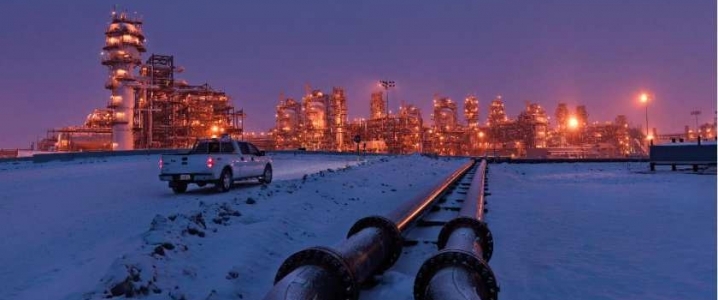Canada’s oil and gas market is profiting from the rally in oil, but in the meantime it has diluted opportunities for some much needed consolidation that could give it a competitive edge over U.S. oil companies.
According to data compiled by Bloomberg, deals made by Canadian oil, natural gas and pipeline companies slumped 29 percent in the first seven months of 2018 to $45.5 billion. If the $22.3 billion investment to absorb subsidiaries by Enbridge Inc., which owns and operates Canada's largest natural gas distribution network, were to be excluded the decline would widen to 64 percent.
During that same time, U.S. deals increased 12 percent to $174.8 billion. Canadian oil and gas companies had hoped to gain a competitive edge over lower-cost shale drillers based in the U.S., with consolidation being an integral part of that change.
Rising oil prices have driven management teams to stay the course. They’ve also lost interest in dilutive share issuance to fund Canadian takeovers.
Observers have been calling out the necessity of Canadian consolidation to lower costs and compete with lower-cost shale drillers in the U.S.
“The ability to attack inefficiencies is much greater when there’s one group of people working on an asset rather than two,” said Rafi Tahmazian, who helps manage about C$900 million ($690 million) in energy investments at Canoe Financial in Calgary. “That’s just a better way to go in this world today, where we’re not focused on just growing production, we’re focused on the rate of return.”
Western Canada Select crude prices climbed 16 percent during the first seven months of 2018, outpacing West Texas Intermediate. The days of slumping crude prices starting three years ago are over, which drove Canadian wildcatters to sell when market recovery looked way off, according to Martin Pelletier, a portfolio manager at TriVest Wealth Counsel in Calgary.
Related: The Next Big Energy Standoff Will Happen Here
Tahmazian thinks that declining oil industry deals can also be explained by certain Canadian government policies, such as carbon taxes that make Canada’s energy sector less competitive than rivals in other countries. Another concern has been a shortage of pipeline capacity in western Canada that’s hurt domestic producers who have to sell their crude oil and gas at discounted prices.
Energy producers have had to rely on their own stock to pay for transactions, with investors and other bankers holding out on buying new equity in these companies. It’s had quite an impact on the market, with all-stock transactions making up 39 percent of deals this year, compared to just 2.5 percent last year.
“Three to five years from now, we’re going to go through another downturn, and a lot of these companies cannot survive,” Tahmazian said. “That could end up making them have to sell in a forced situation at a much lower valuation. It’s important that potential sellers recognize that is a risk for them.”
Vermilion Energy Inc. and Baytex Energy Corp. have both arranged all-stock buyouts. Both companies have a significant presence in Canadian oil and gas production and distribution.
Oil and gas observers also wonder what impact Saudi Arabia’s fallout with Canada will have on Canadian oil and gas markets.
Saudi Arabia has been outraged with Canada’s criticism of the recent arrest of Saudi women’s rights activists.
Saudi Arabia, which is the second largest source of oil imports to Canada behind the U.S., is reacting to what it perceives as growing foreign intrusion into its own internal matters. The country said it will freeze all new business between Saudi Arabia and Canada.
The leading OPEC country will also be recalling thousands of Saudi students who are attending Canadian universities, which is expected to impact the Canadian economy.
Related: China’s Oil Futures Jump To Record High
The political fight between the two countries has been ongoing. Ottawa had made the demand that Saudi Arabia release detained women’s rights activists.
Earlier this week, Saudi Arabia ordered the Canadian ambassador to leave Saudi Arabia “within 24 hours” after Canada’s criticism of the recent arrests.
Canada’s fight with Saudi Arabia has its roots in the OPEC oil crisis of 1973 when it was targeted as one of the western powers included in the Arab oil embargo. The four-fold global oil price spike threw Canada into a whirlwind that eventually led to consolidation and growth in the market.
By Jon LeSage for Oilprice.com
More Top Reads From Oilprice.com:
- Oil Prices Inch Higher As Sanctions On Iran Kick In
- Crackdown Looms As Maduro Survives Assassination Attempt
- Pakistan: Exxon Is Close To Making A Mega Oil Discovery


















